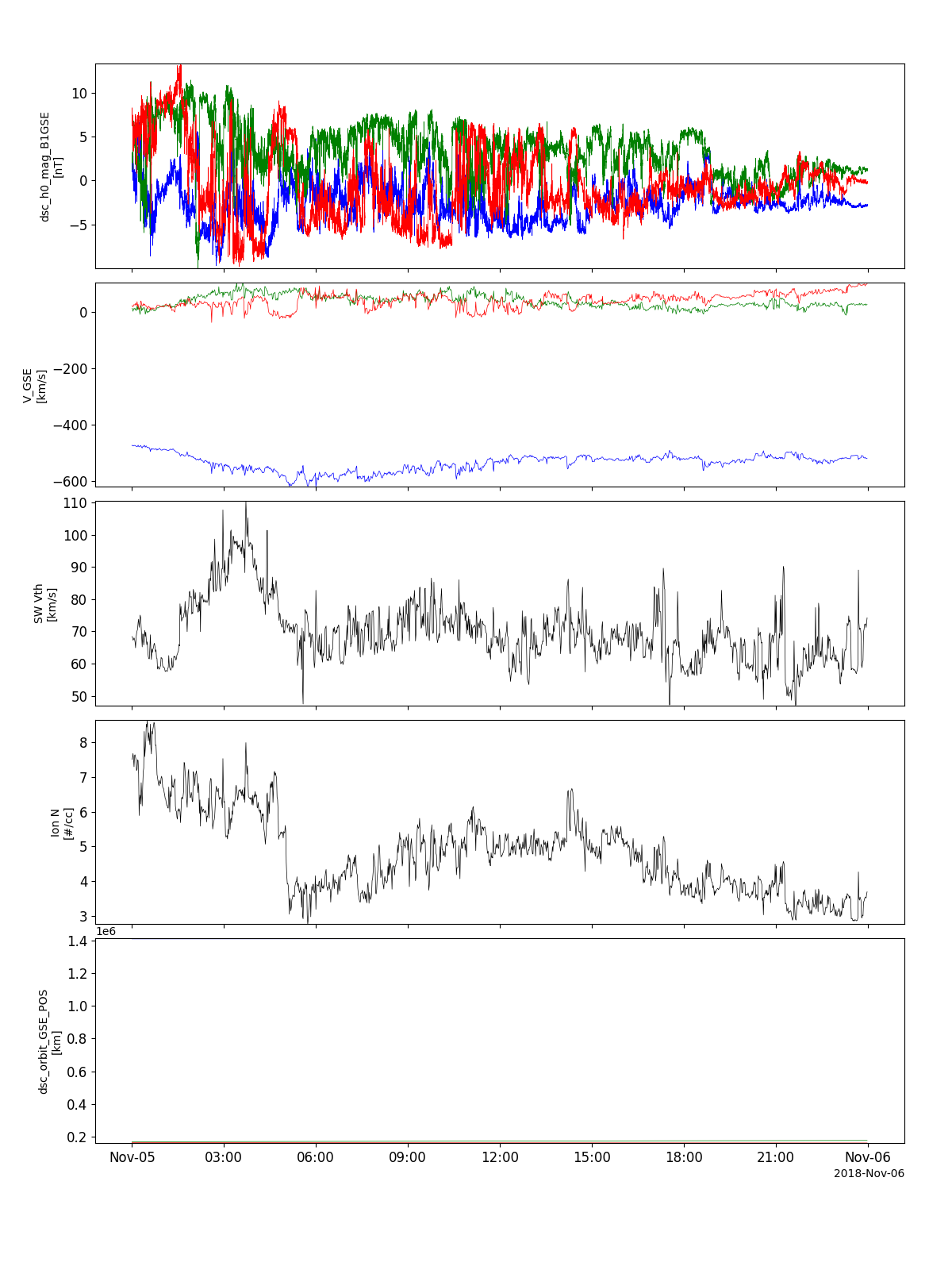Deep Space Climate Observatory (DSCOVR)
The routines in this module can be used to load data from the Deep Space Climate Observatory (DSCOVR) mission.
Magnetometer (MAG)
- pyspedas.dscovr.mag(trange=['2018-10-16', '2018-10-17'], datatype='h0', suffix='', get_support_data=False, varformat=None, varnames=[], downloadonly=False, notplot=False, no_update=False, time_clip=False)[source]
This function loads DSCOVR Fluxgate Magnetometer data
- Parameters:
trange (
listofstr) – time range of interest [starttime, endtime] with the format ‘YYYY-MM-DD’,’YYYY-MM-DD’] or to specify more or less than a day [‘YYYY-MM-DD/hh:mm:ss’,’YYYY-MM-DD/hh:mm:ss’]datatype (
str) –- Data type; Valid options:
‘h0’: 1-sec Definitive Data (default)
suffix (
str) – The tplot variable names will be given this suffix. By default, no suffix is added.get_support_data (
bool) – Data with an attribute “VAR_TYPE” with a value of “support_data” will be loaded into tplot. By default, only loads in data with a “VAR_TYPE” attribute of “data”.varformat (
str) – The file variable formats to load into tplot. Wildcard character “*” is accepted. By default, all variables are loaded in.varnames (
listofstr) – List of variable names to load (if not specified, all data variables are loaded)downloadonly (
bool) – Set this flag to download the CDF files, but not load them into tplot variablesnotplot (
bool) – Return the data in hash tables instead of creating tplot variablesno_update (
bool) – If set, only load data from your local cachetime_clip (
bool) – Time clip the variables to exactly the range specified in the trange keyword
- Return type:
Listoftplot variables created.
Example
import pyspedas
from pytplot import tplot
mag_vars = pyspedas.dscovr.mag(trange=['2018-11-5', '2018-11-6'])
tplot('dsc_h0_mag_B1GSE')
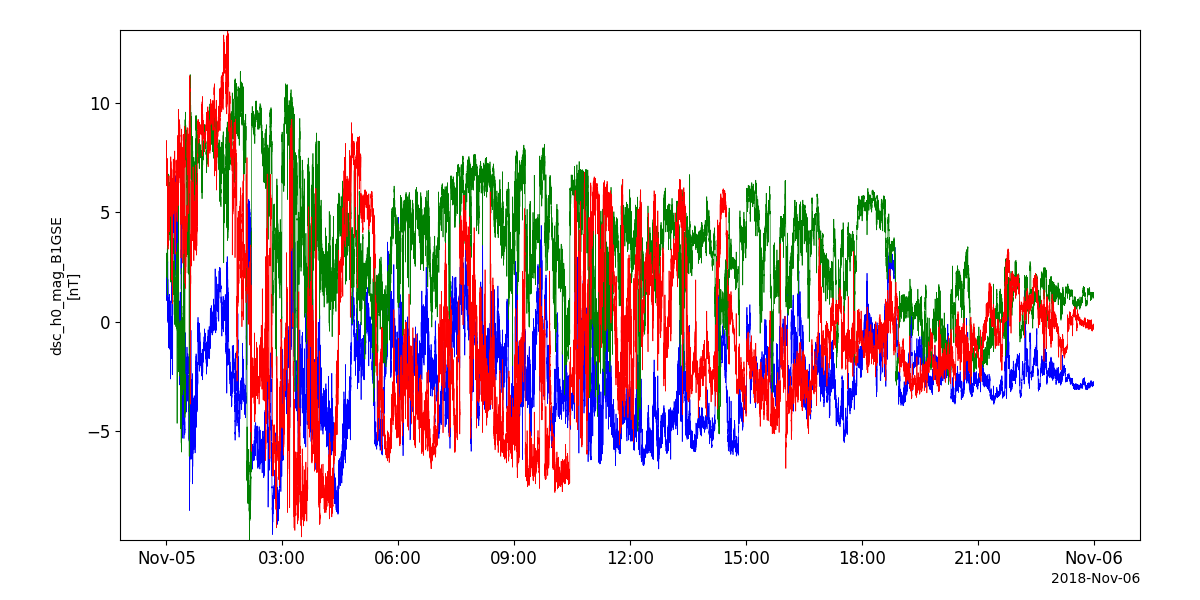
Faraday cup (FC)
- pyspedas.dscovr.fc(trange=['2018-10-16', '2018-10-17'], datatype='h1', suffix='', get_support_data=False, varformat=None, varnames=[], downloadonly=False, notplot=False, no_update=False, time_clip=False)[source]
This function loads DSCOVR Faraday Cup data
- Parameters:
trange (
listofstr) – time range of interest [starttime, endtime] with the format ‘YYYY-MM-DD’,’YYYY-MM-DD’] or to specify more or less than a day [‘YYYY-MM-DD/hh:mm:ss’,’YYYY-MM-DD/hh:mm:ss’]datatype (
str) –- Data type; Valid options:
‘h1’: 1-minute Isotropic Maxwellian parameters for solar wind protons (default)
suffix (
str) – The tplot variable names will be given this suffix. By default, no suffix is added.get_support_data (
bool) – Data with an attribute “VAR_TYPE” with a value of “support_data” will be loaded into tplot. By default, only loads in data with a “VAR_TYPE” attribute of “data”.varformat (
str) – The file variable formats to load into tplot. Wildcard character “*” is accepted. By default, all variables are loaded in.varnames (
listofstr) – List of variable names to load (if not specified, all data variables are loaded)downloadonly (
bool) – Set this flag to download the CDF files, but not load them into tplot variablesnotplot (
bool) – Return the data in hash tables instead of creating tplot variablesno_update (
bool) – If set, only load data from your local cachetime_clip (
bool) – Time clip the variables to exactly the range specified in the trange keyword
- Return type:
Listoftplot variables created.
Example
import pyspedas
from pytplot import tplot
fc_vars = pyspedas.dscovr.fc(trange=['2018-11-5', '2018-11-6'])
tplot(['dsc_h1_fc_V_GSE', 'dsc_h1_fc_THERMAL_SPD', 'dsc_h1_fc_Np', 'dsc_h1_fc_THERMAL_TEMP'])
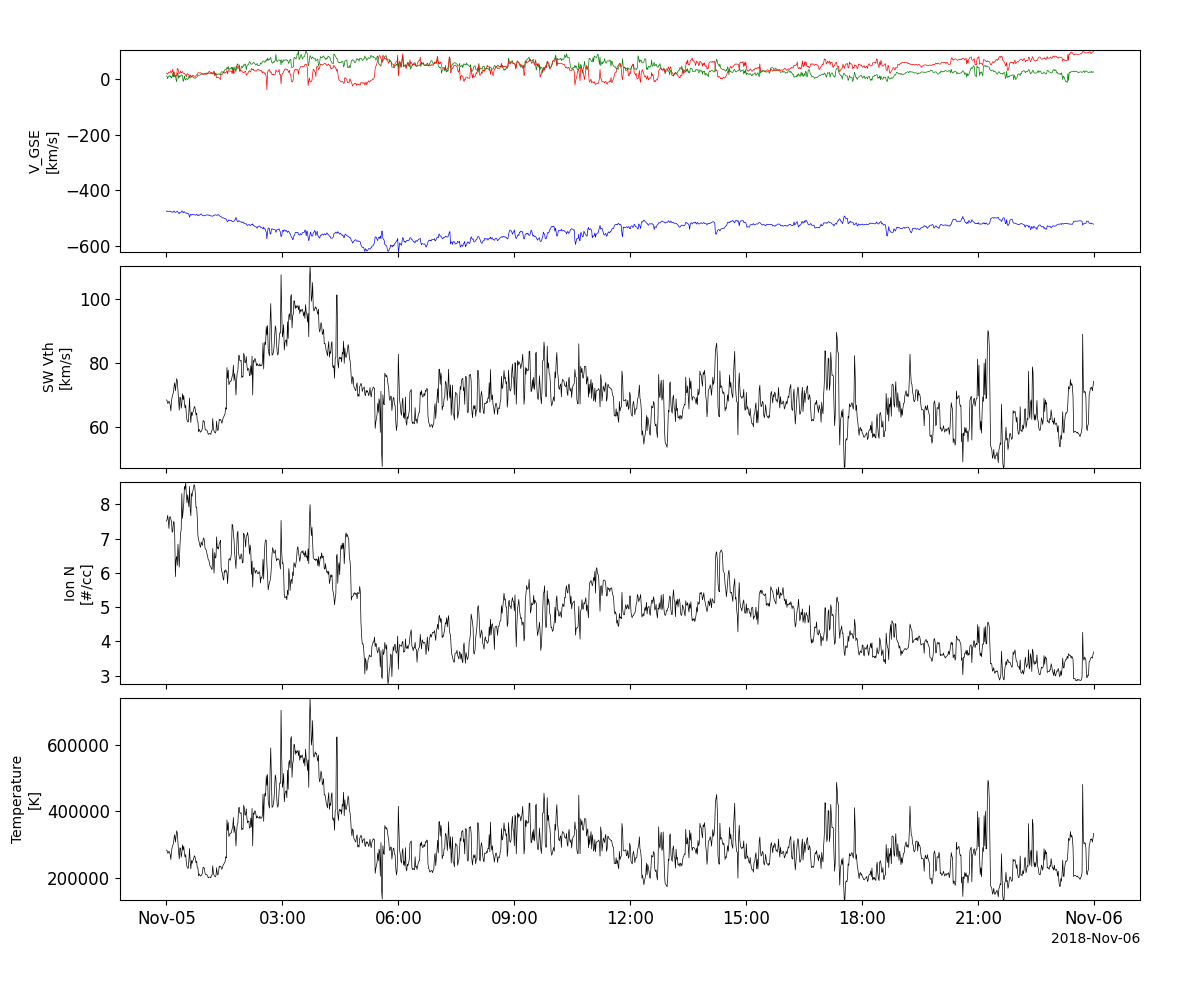
Orbit data
- pyspedas.dscovr.orb(trange=['2018-10-16', '2018-10-17'], datatype='orbit', suffix='', get_support_data=False, varformat=None, varnames=[], downloadonly=False, notplot=False, no_update=False, time_clip=False)[source]
This function loads DSCOVR Ephemeris data
- Parameters:
trange (
listofstr) – time range of interest [starttime, endtime] with the format ‘YYYY-MM-DD’,’YYYY-MM-DD’] or to specify more or less than a day [‘YYYY-MM-DD/hh:mm:ss’,’YYYY-MM-DD/hh:mm:ss’]suffix (
str) – The tplot variable names will be given this suffix. By default, no suffix is added.get_support_data (
bool) – Data with an attribute “VAR_TYPE” with a value of “support_data” will be loaded into tplot. By default, only loads in data with a “VAR_TYPE” attribute of “data”.varformat (
str) – The file variable formats to load into tplot. Wildcard character “*” is accepted. By default, all variables are loaded in.varnames (
listofstr) – List of variable names to load (if not specified, all data variables are loaded)downloadonly (
bool) – Set this flag to download the CDF files, but not load them into tplot variablesnotplot (
bool) – Return the data in hash tables instead of creating tplot variablesno_update (
bool) – If set, only load data from your local cachetime_clip (
bool) – Time clip the variables to exactly the range specified in the trange keyword
- Return type:
Listoftplot variables created.
Example
import pyspedas
from pytplot import tplot
orb_vars = pyspedas.dscovr.orb(trange=['2018-11-5', '2018-11-6'])
tplot(['dsc_orbit_SUN_R', 'dsc_orbit_GCI_POS', 'dsc_orbit_GCI_VEL', 'dsc_orbit_GSE_POS', 'dsc_orbit_MOON_GSE_POS'])
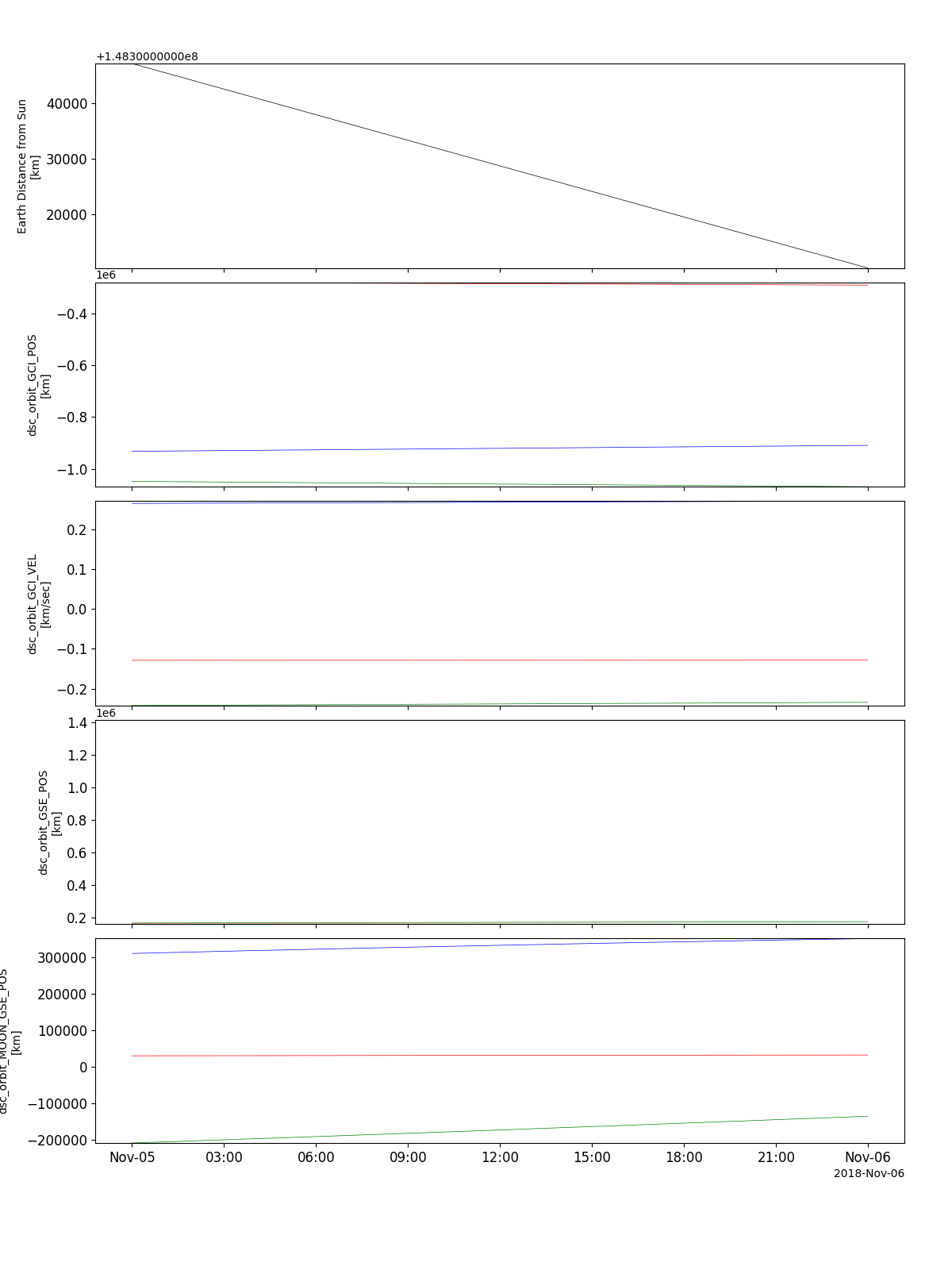
Attitude data
- pyspedas.dscovr.att(trange=['2018-10-16', '2018-10-17'], datatype='orbit', suffix='', get_support_data=False, varformat=None, varnames=[], downloadonly=False, notplot=False, no_update=False, time_clip=False)[source]
This function loads DSCOVR Attitude data
- Parameters:
trange (
listofstr) – time range of interest [starttime, endtime] with the format ‘YYYY-MM-DD’,’YYYY-MM-DD’] or to specify more or less than a day [‘YYYY-MM-DD/hh:mm:ss’,’YYYY-MM-DD/hh:mm:ss’]suffix (
str) – The tplot variable names will be given this suffix. By default, no suffix is added.get_support_data (
bool) – Data with an attribute “VAR_TYPE” with a value of “support_data” will be loaded into tplot. By default, only loads in data with a “VAR_TYPE” attribute of “data”.varformat (
str) – The file variable formats to load into tplot. Wildcard character “*” is accepted. By default, all variables are loaded in.varnames (
listofstr) – List of variable names to load (if not specified, all data variables are loaded)downloadonly (
bool) – Set this flag to download the CDF files, but not load them into tplot variablesnotplot (
bool) – Return the data in hash tables instead of creating tplot variablesno_update (
bool) – If set, only load data from your local cachetime_clip (
bool) – Time clip the variables to exactly the range specified in the trange keyword
- Return type:
Listoftplot variables created.
Example
import pyspedas
from pytplot import tplot
att_vars = pyspedas.dscovr.att(trange=['2018-11-5', '2018-11-6'])
tplot(['dsc_att_GSE_Yaw', 'dsc_att_GSE_Pitch', 'dsc_att_GSE_Roll'])
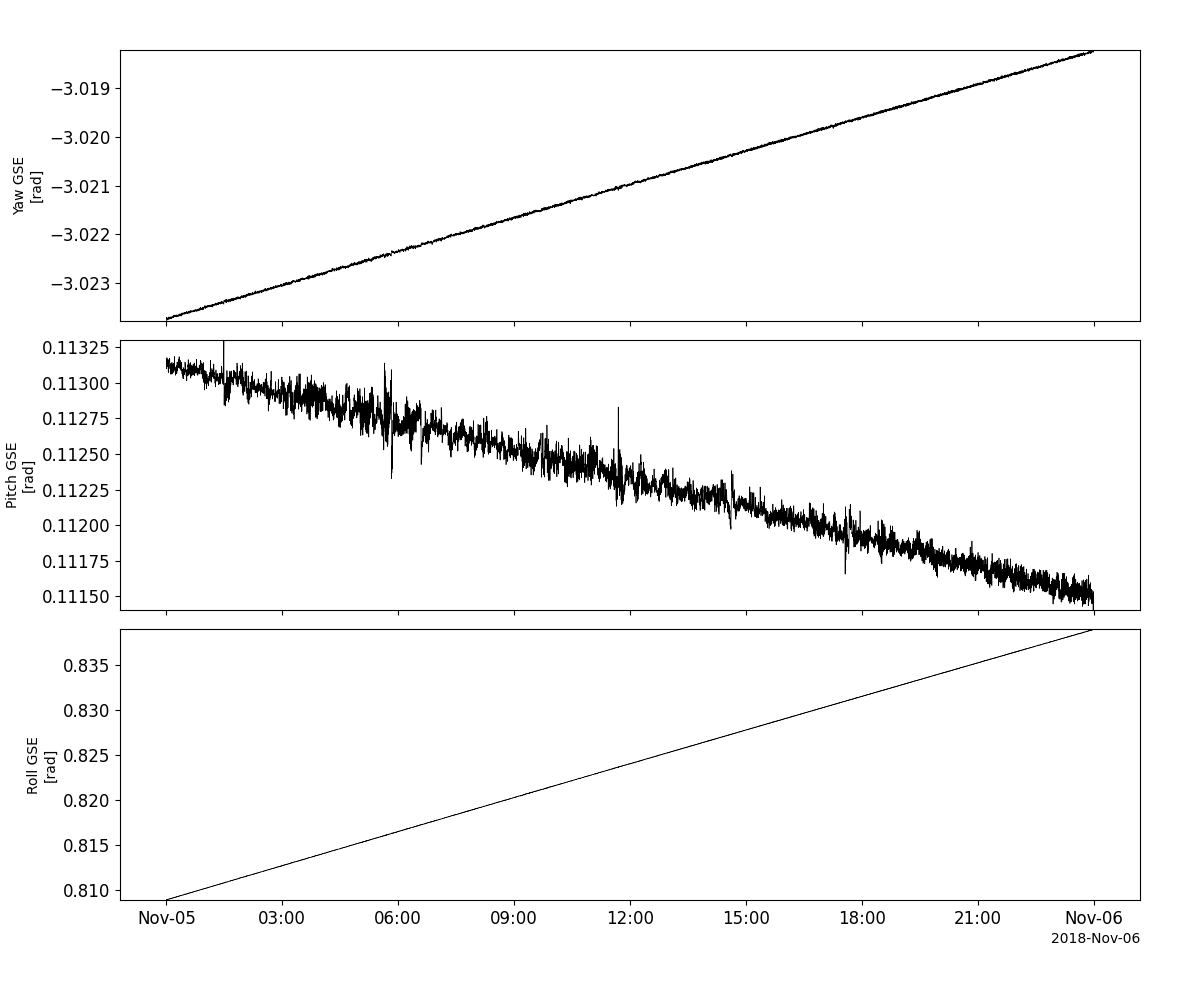
Load all data at once
- pyspedas.dscovr.all(trange=['2018-10-16', '2018-10-17'], downloadonly=False, suffix='', no_update=False, time_clip=False)[source]
This function loads all DSCOVR data
- Parameters:
trange (
listofstr) – time range of interest [starttime, endtime] with the format ‘YYYY-MM-DD’,’YYYY-MM-DD’] or to specify more or less than a day [‘YYYY-MM-DD/hh:mm:ss’,’YYYY-MM-DD/hh:mm:ss’]downloadonly (
bool) – Set this flag to download the CDF files, but not load them into tplot variablesno_update (
bool) – If set, only load data from your local cachetime_clip (
bool) – Time clip the variables to exactly the range specified in the trange keyword
- Return type:
Listoftplot variables created.
Example
import pyspedas
from pytplot import tplot
all_vars = pyspedas.dscovr.all(trange=['2018-11-5', '2018-11-6'])
tplot(['dsc_h0_mag_B1GSE', 'dsc_h1_fc_V_GSE', 'dsc_h1_fc_THERMAL_SPD', 'dsc_h1_fc_Np', 'dsc_orbit_GSE_POS'])
